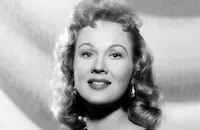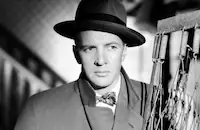Smart Girls Don't Talk

Brief Synopsis
Cast & Crew
Richard Bare
Virginia Mayo
Bruce Bennett
Robert Hutton
Tom D'andrea
Richard Rober
Film Details
Technical Specs

Synopsis
When the Club Bermuda, a gambling club run by Marty Fain, is held up by petty gangster Johnny Warjak, Fain offers to reimburse his customers for their losses. Among the customers claiming losses is society woman Linda Vickers. Fain tells her privately that he knows the jewels she was wearing were paste, and when she insists that they were insured, he agrees to double her claim if she can prove it. Linda then accompanies Fain to her apartment, where she admits that she has no insurance policy. The two have a drink together and begin an affair. The next morning, Linda is wakened by homicide detective Lieutenant McReady, who informs her that Warjak was killed and that his murderer used her car to make his getaway. Although Linda realizes that Warjak must have been killed on Fain's orders, she provides an alibi for him and does not tell McReady that she left her car at the club. Later Linda and Fain take a drive in the country and talk about their pasts. Linda explains that her "memory" now earns her living. Fain then offers to pay her $18,000 for her "diamonds." When they return to town, they find Linda's brother "Doc," a recent medical school graduate, waiting for her. Doc disapproves of Linda's relationship with Fain, and the following night, at the Club Bermuda, Linda returns Fain's check and breaks off their relationship. The next evening, Doc returns to the club to apologize to singer Toni Peters for his drunken behavior the previous night. While he is there, Fain is at the apartment of gambler Nelson Clark, who owes him money. Clark pulls a gun on Fain, who kills him and then, wounded, manages to return to the club. Fain's men ask Doc to attend to him. Later, afraid that Doc will report the gunshot wound, as he is legally required to do, Fain's men follow him from the club and kill him. The police suspect Fain of killing Clark and Doc, but Toni, who has been beaten by Fain's men, refuses to testify that Doc was at the club on the night that Clark was murdered. McReady then asks Linda to help them put Fain in jail. She begs Fain to take her back, and when he is out of the room, steals his gun. After the police identify Fain's gun as the weapon that killed Clark, McReady asks Linda to help him trap Fain. Through a ruse, Linda lures Fain to Toni's apartment, where he admits that he killed Clark. The police secretly tape Fain's confession and arrest him. Later, McReady joins Linda as she walks away from her past.

Director

Richard Bare
Cast

Virginia Mayo

Bruce Bennett

Robert Hutton

Tom D'andrea
Richard Rober

Helen Westcott

Richard Benedict
Ben Welden
Richard Walsh
Eddie Foster
George Hoagland
Bud Cokes
Jerry Mills

Phyllis Coates
Janet Warren
Ted Stanhope

Jack Mower
Philo Mccullough
Ray Montgomery
Edna Harris
Charles Jordan

Paul Panzer
Harry Hayden
Donald Olsen
Fred Kelsey
Leo White
Creighton Hale
Crew
Alma Armstrong
Robert Burks
David Buttolph
William Classen
Elmer Decker
Saul Elkins
Stanley Fleischer
Burdette Hoke
Clarence Kolster
Ted Kring
John Maxwell
Ted Mccord
George Nogle
Don Page
Pat Patterson
Don Pelosi
Leonid Raab
William Sackheim
Leonard South
George Stout
Doris Stutz
Lee Towers
William Wallace
Perc Westmore

Film Details
Technical Specs

Articles
Virginia Mayo (1920-2005)
She was born Virginia Clara Jones in St. Louis, Missouri on November 30, 1920, and got her show business start at the age of six by enrolling in her aunt's School of Dramatic Expression. While still in her teens, she joined the nightclub circuit, and after paying her dues for a few years traveling across the country, she eventually caught the eye of movie mogul Samuel Goldwyn. He gave her a small role in her first film, starring future husband, Michael O'Shea, in Jack London (1943). She then received minor billing as a "Goldwyn Girl," in the Danny Kaye farce, Up In Arms (1944). Almost immediately, Goldwyn saw her natural movement, comfort and ease in front of the camera, and in just her fourth film, she landed a plumb lead opposite Bob Hope in The Princess and the Pirate (1944). She proved a hit with moviegoers, and her next two films would be with her most frequent leading man, Danny Kaye: Wonder Man (1945), and The Kid from Brooklyn (1946). Both films were big hits, and the chemistry between Mayo and Kaye - the classy, reserved blonde beauty clashing with the hyperactive clown - was surprisingly successful.
Mayo did make a brief break from light comedy, and gave a good performance as Dana Andrews' unfaithful wife, Marie, in the popular post-war drama, The Best Years of Their Lives (1946); but despite the good reviews, she was back with Kaye in The Secret Life of Walter Mitty (1947), and A Song Is Born (1948).
It wasn't until the following year that Mayo got the chance to sink her teeth into a meaty role. That film, White Heat (1949), and her role, as Cody Jarrett's (James Cagney) sluttish, conniving wife, Verna, is memorable for the sheer ruthlessness of her performance. Remember, it was Verna who shot Cody¿s mother in the back, and yet when Cody confronts her after he escapes from prison to exact revenge for her death, Verna effectively places the blame on Big Ed (Steve Cochran):
Verna: I can't tell you Cody!
Cody: Tell me!
Verna: Ed...he shot her in the back!!!
Critics and fans purred over the newfound versatility, yet strangely, she never found a part as juicy as Verna again. Her next film, with Cagney, The West Point Story (1950), was a pleasant enough musical; but her role as Lady Wellesley in Captain Horatio Hornblower R.N. (1951), co-starring Gregory Peck, was merely decorative; that of a burlesque queen attempting to earn a university degree in the gormless comedy, She¿s Working Her Way Through College (1952); and worst of all, the Biblical bomb, The Silver Chalice (1954) which was, incidentally, Paul Newman's film debut, and is a film he still derides as the worst of his career.
Realizing that her future in movies was slowing down, she turned to the supper club circuit in the 60s with her husband, Michael O'Shea, touring the country in such productions as No, No Nanette, Barefoot in the Park, Hello Dolly, and Butterflies Are Free. Like most performers who had outdistanced their glory days with the film industry, Mayo turned to television for the next two decades, appearing in such shows as Night Gallery, Police Story, Murder She Wrote, and Remington Steele. She even earned a recurring role in the short-lived NBC soap opera, Santa Barbara (1984-85), playing an aging hoofer named "Peaches DeLight." Mayo was married to O'Shea from 1947 until his death in 1973. She is survived by their daughter, Mary Johnston; and three grandsons.
by Michael T. Toole

Virginia Mayo (1920-2005)
Quotes
Trivia
Notes
The film's working titles were Smart Girls Don't Cry and Dames Don't Talk. This film marked Richard Bare's first directorial assignment.














